Relationship Scams And Their Impact On Memory
By:
• Tim McGuinness, Ph.D. – Anthropologist, Scientist, Director of the Society of Citizens Against Relationship Scams Inc.
• Vianey Gonzalez – Psychologist, Certified Deception Professional, Director of the Society of Citizens Against Relationship Scams Inc.
Memory And Your Recollections Of A Relationship Scam Can Be Wrong!
The very first thing to know about memory after you have been in a relationship scam is that trauma has a profound impact on your mind.
You are not what you think you are. You are a system of physical functions that take place inside the brain and elsewhere in your body. Your memories, feelings, thinking, abilities, biases, and beliefs are all electrochemical reactions happening in your brain, nervous and limbic systems.
Why is this important to know?
Because what you remember, believe, and feel is controlled by these systems. Your very identity is not anything close to as solid as you imagine it is. The criminals that scammed you do not fully understand this, but they know how to exploit it,
In other articles, we have written about things like amygdala hijacks and how profoundly impactful that is, not only in the way the scammers manipulate their victims but in the aftereffects as well. We have also written about TemporoParietal Junction (TPJ) and its effect on what victims believe. But memory, especially distorted or edited memories have a major impact both on the recollection of events but also on victim recovery.
Don’t Panic
If you find that your memories have been affected by your experience don’t panic. It does not mean you are insane. It just means you will need to be aware of how your mind works and take your memory function into consideration when you recall these events.
What is Memory?
Memory is the process of encoding, storing, and retrieving information in your brain.
- Encoding is the process of converting information into a form that can be stored in the brain.
- Storage is the process of maintaining encoded information over time.
- Retrieval is the process of accessing stored information.
Emotion plays a significant role in memory. Emotional events are more likely to be encoded and stored in memory than neutral events. This is because emotions activate the amygdala, a brain region that is involved in processing emotions. The amygdala sends signals to the hippocampus, another brain region that is involved in memory, to help store the emotional event.
Emotion can also influence the retrieval of memories. Emotional memories are more likely to be retrieved than neutral memories. This is because emotions can activate the amygdala, which can trigger the retrieval of the emotional memory.
Emotion can also influence the accuracy of memories. Emotional memories can be distorted by the strong emotions that were experienced at the time of the event. This can lead to false memories or distorted memories of the event.
Here are some examples of how emotion can influence memory:
- A person who is in a car accident is more likely to remember the accident than a person who witnesses the accident. This is because the car accident is a highly emotional event.
- A person who is studying for a test is more likely to remember the information if they are interested in the subject. This is because interest is an emotion that can motivate learning and memory.
- A person who is stressed is more likely to remember the things that went wrong during the day than the things that went right. This is because stress is a negative emotion that can bias memory towards negative information.
Overall, emotion plays a significant role in memory. Emotion can influence the encoding, storage, retrieval, and accuracy of memories.
Are Memories Real and Reliable for Traumatized Crime Victims?
Trauma can have a profound impact on memory. People who have experienced a traumatic event may have difficulty remembering the event clearly, or they may have distorted memories of the event. This can make it difficult for crime victims to testify in court or to get the help they need to recover from their trauma.
Traumatic Memories
Traumatic memories are memories of events that were perceived as threatening or life-threatening, and that caused intense fear, helplessness, or horror – this can include the experience of a relationship scam. Traumatic memories can be formed at any age, but they are most common in childhood.
Traumatic memories are stored in the brain differently than other types of memories. They are often fragmented, meaning that they are not stored in chronological order and may be incomplete. They can also be intrusive, meaning that they come into mind without warning and can be very upsetting.
Traumatic memories can be accessed after the traumatic event in a number of ways. They may be triggered by sights, sounds, smells, or other stimuli that are similar to the stimuli that were present during the traumatic event. They may also be triggered by thoughts, feelings, or bodily sensations that are associated with the trauma.
Traumatic memories can be accurate and real, but they can also be distorted. This is because the brain’s memory system is not perfect, and it can be influenced by a number of factors, including the person’s emotions at the time of the event, their coping mechanisms, and their cultural background.
Here are some examples of how traumatic memories can be distorted:
- A person who is sexually assaulted may remember the assault as being more violent than it actually was.
- A person who witnesses a murder may remember the murder as happening in slow motion.
- A person who goes through a natural disaster may remember the disaster as being more destructive than it actually was.
- A romance scam victim may not remember many aspects of the manipulation that occurred during the crime or at the end, and over-emphasize others aspects such as threats.
How Trauma Affects Memory
Trauma is a deeply stressful event that overwhelms a person’s ability to cope. It can be caused by a variety of events, including physical or sexual assault, war, natural disasters, and serious accidents.
When a person experiences trauma, their brain goes into survival mode. This means that the brain focuses on the most important information, such as the threat of danger and how to escape. Other information, such as the details of the event, may be lost or distorted.
The way that trauma affects memory can vary from person to person. Some people may have difficulty remembering any details of the event, while others may remember the event in vivid detail. Some people may have distorted memories of the event, such as remembering things that did not happen or forgetting things that did happen.
When a person experiences trauma, their brain releases stress hormones such as cortisol and adrenaline. These hormones can damage the hippocampus, which is the part of the brain that is responsible for memory formation and consolidation.
Trauma can also lead to changes in the amygdala, which is the part of the brain that is responsible for processing emotions. These changes can make it difficult for people to control their emotions and can also lead to memory problems.
Can we Really Trust our Memories?
The reliability of our memories after a traumatic experience can vary depending on a number of factors, including the severity of the trauma, the age of the person at the time of the trauma, and the amount of time that has passed since the trauma occurred.
Traumatic experiences can cause significant changes in the brain, including changes to the hippocampus, a brain region that is involved in memory formation and storage. These changes can make it difficult for the brain to accurately encode and store memories of the traumatic event.
In addition, trauma can trigger a number of emotional responses, such as fear, anxiety, and anger. These emotions can also interfere with memory formation and storage.
As a result of these factors, traumatic memories may be inaccurate or distorted. For example, people who have experienced trauma may have difficulty remembering the sequence of events, or they may remember certain details more clearly than others. They may also have false memories of the event.
It is important to note that even if a traumatic memory is inaccurate or distorted, it is still real to the person who experienced it. Traumatic memories can have a significant impact on a person’s life, even if they are not accurate.
Factors that Affect the Reliability of Memories
There are a number of factors that can affect the reliability of memories, including:
- The severity of the trauma: More severe trauma is more likely to lead to memory problems.
- The age of the victim: Children are more likely to have difficulty remembering traumatic events than adults.
- The time that has passed since the trauma: Memories tend to fade over time, and traumatic memories may fade more quickly than other memories.
- The presence of other stressors: Other stressors in the victim’s life, such as poverty or homelessness, can make it more difficult to remember traumatic events.
- The victim’s mental health: People with mental health conditions, such as post-traumatic stress disorder (PTSD), are more likely to have difficulty remembering traumatic events.
False Memories
What we imagine or believe can become stored and indistinguishable from real memories.
This is known as false memory implantation. False memories are memories of events that never actually happened. They can be created through a variety of ways, including suggestion, imagination, and hypnosis. This includes manipulation!
False memories can be very convincing, and people who have false memories often believe that they are real. This can make it difficult to distinguish between real and false memories.
There are a number of factors that can contribute to the formation of false memories. One factor is suggestion. When someone suggests that something happened, even if it didn’t, it can increase the likelihood that the person will develop a false memory of that event. A scam victim’s suggestibility plays a large role in this.
Another factor that can contribute to the formation of false memories is imagination. When we imagine something happening, it can activate the same brain regions that are activated when we experience something in real life. This can lead to the creation of false memories that are indistinguishable from real memories. We see this manifest often in memories of video calls with the scammer where the victim truly believes it is not only real but could never be falsified, even to the point of remembering things in the call to confirm this that never happened.
Hypnosis can also be used to implant false memories. Hypnosis is a state of deep relaxation and concentration. During hypnosis, people are more susceptible to suggestion and may be more likely to develop false memories. There is some debate as to whether scammers have learned how to hypnotize their victims remotely. However, their manipulation techniques would be sufficient in most cases to have similar effects, especially employing sleep deprivation to increase suggestibility.
False memories can have a significant impact on people’s lives. They can lead to anxiety, depression, and post-traumatic stress disorder (PTSD). False memories can also be used to manipulate people, such as in false confessions or child abuse cases.
If you are concerned that you may have a false memory, it is important to talk to a therapist. A therapist can help you to understand the nature of false memories and to develop coping mechanisms for dealing with them. You can find counselors and therapists at counseling.AgainstScams.org
Here are some tips for preventing false memories:
- Be careful about who you talk to about your traumatic experiences. Some people may be more likely to suggest false memories than others. Other scam victims, for example, can spread false beliefs that can become false memories themselves.
- Be critical of the information that you receive. Don’t automatically believe everything that you are told, even if it comes from a trusted source. When SCARS shares information with you we expect that you will research the information on your own to confirm what we are telling you.
- Be aware of your own biases. We all have biases that can influence our memories. Be aware of your own biases and try to correct them when you are trying to remember something.
- Be careful about using hypnosis. Hypnosis can be a useful tool, but it is important to be aware of the risks of false memory implantation. If you do choose to use hypnosis, make sure to work with a qualified therapist.
The Amygdala And Love
When we experience something emotionally charged, the amygdala releases hormones that help us to remember the event. This can be helpful in some cases, such as when we need to remember a danger to avoid it in the future. However, it can also lead to distorted memories, especially when we are experiencing strong emotions such as love or passion.
One way that the amygdala can distort memories is by filtering out information that is not consistent with our current emotional state. For example, if we are in love, the amygdala may filter out negative memories about our partner, even if those memories are accurate. This can lead to us having a more positive view of our partner than is realistic.
Another way that the amygdala can distort memories is by exaggerating the emotional intensity of events. This is because the amygdala is involved in both the processing of emotions and the formation of memories. When we experience something emotionally charged, the amygdala releases hormones that increase our arousal and attention. This can lead to us forming more vivid memories of the event, but it can also make those memories seem more emotionally intense than they actually were.
This can be a problem when it comes to relationships, as it can lead to us having unrealistic expectations of our partners. For example, if we remember our first kiss with our partner as being incredibly passionate, we may expect all of our kisses to be that way. This can lead to disappointment and frustration when our partner does not meet those expectations.
It is important to remember that the amygdala is a very powerful part of the brain, and it can have a significant impact on our memories. However, it is also important to note that the amygdala is not the only part of the brain involved in memory formation and consolidation. There are other parts of the brain that are responsible for evaluating the accuracy of memories and for integrating them into our existing knowledge of the world. This means that it is possible to overcome the distortions caused by the amygdala by thinking critically about our memories and by comparing them to other information that we have.
The amygdala can distort, modify, or even erase memories when it is in control of the brain
The amygdala is a small almond-shaped structure in the brain that plays a key role in processing emotions, particularly fear and aggression. It is also involved in memory formation and consolidation.
When the amygdala is activated, it can release hormones such as cortisol and adrenaline. These hormones can impair cognitive function and make it difficult to think clearly. This can lead to distorted memories of traumatic events.
For example, a person who has been attacked may remember their attacker as being larger or stronger than they actually were. They may also remember the event happening in slow motion or with greater detail than is actually possible.
The amygdala can also modify or even erase memories. This is because the amygdala can influence the hippocampus, which is the part of the brain responsible for memory formation and consolidation.
For example, a person who has experienced a traumatic event may try to suppress the memory of that event in order to protect themselves from emotional pain. Over time, this can lead to the memory becoming distorted or even erased altogether.
Here are some specific examples of how the amygdala can distort, modify, or erase memories:
- Distorted memories: A person who has been sexually assaulted may remember their attacker as being someone they knew and trusted, even if this was not the case.
- Modified memories: A person who has been in a car accident may remember the accident happening in slow motion, even though it actually happened very quickly.
- Erased memories: A person who has witnessed a murder may forget the details of the murder, even though they were able to recall them shortly after the event.
It is important to note that the amygdala does not always distort, modify, or erase memories. It can also play a role in forming accurate memories of traumatic events. However, it is important to be aware of the potential impact of the amygdala on memory, especially when dealing with traumatic events.
If you are concerned that your memories of a traumatic event may be distorted, modified, or erased, it is important to seek professional help. A therapist can help you to process your trauma and to develop coping mechanisms.
Grief Affects Our Memories
Grief can play a significant role in the formation, storage, and access of memories. Grief is obviously a complex emotional response to loss, and it can affect our cognitive functions, including memory.
Grief can make it difficult to form new memories. This is because grief can impair our ability to focus and pay attention. Grief can also make it difficult to process emotional information. As a result, we may be less likely to encode new memories in our brains.
Grief can also affect the storage mechanisms of memories. Grief can lead to changes in the hippocampus, a brain region that is involved in memory formation and storage. These changes can make it difficult for the brain to accurately store memories.
Finally, grief can affect the retrieval of memories. Grief can trigger a number of emotional responses, such as sadness, anger, and guilt. These emotions can interfere with the retrieval of memories. This can include avoidance of memories that are painful.
In addition, grief can lead to the distortion of memories or the creation of false memories. This is because grief can impair our ability to distinguish between reality and fantasy. We may also be more likely to believe that our memories are accurate, even if they are not.
Here are some examples of how grief can distort memories or create false memories:
- A person who has lost a loved one may remember the last conversation they had with their loved one more positively than it actually was.
- A person who has lost a child may remember their child as being more perfect than they actually were.
- A person who has experienced a traumatic loss may develop false memories of the event.
- A scam victim often has difficulty after a scam ends believing that it was all false because they remember the loving relationship, creating or enhancing their doubt about being the victim of these crimes.
It is important to note that not everyone who experiences grief will have distorted memories or false memories. However, it is something to be aware of, especially if you are struggling with grief following the end of the scam.
How to Improve the Accuracy of Memories
There are a number of things that crime victims can do to improve the accuracy of their memories, including:
- Talk about the event: Talking about the traumatic event with a trusted friend, family member, or therapist can help to improve memory accuracy.
- Write about the event: Writing about the traumatic event can also help to improve memory accuracy.
- Avoid alcohol and drugs: Alcohol and drugs can interfere with memory formation and recall.
- Get enough sleep: Sleep is essential for memory consolidation.
- Manage stress: Stress can interfere with memory accuracy. Finding healthy ways to manage stress, such as exercise and relaxation techniques, can help to improve memory accuracy.
How to Help Traumatized Crime Victims
There are a number of things that can be done to help traumatized crime victims, including:
- Provide emotional support: Crime victims need to know that they are not alone and that there are people who care about them. Listening to them, validating their experiences, and offering support can help them to cope with their trauma.
- Help them to access resources: There are a number of resources available to help crime victims, such as counseling, support groups, and financial assistance. Helping crime victims to access these resources can help them to recover from their trauma and rebuild their lives.
- Advocate for them: Crime victims may need help to navigate the legal system, to get their rights respected, and to get the help they need. Advocating for crime victims can help them to get the justice they deserve and to move on from their trauma.
Conclusion
Memories of traumatic events can be unreliable, but there are things that crime victims can do to improve the accuracy of their memories. Talking about the event, writing about the event, avoiding alcohol and drugs, getting enough sleep, and managing stress can all help to improve memory accuracy.
Remember, you are not alone. Millions of people experience false memories each year. With the right help, you can learn to cope with false memories and live a happy and meaningful life.
If you are a crime victim who is struggling with your memories of the event, please know that you are not alone. There are people who care about you and want to help. Please reach out for support and take care of yourself.
Confirmed original by plagiarismdetector.net
More:
- The Amygdala Hijack! A SCARS™ Guide [Infographic][Updated] (romancescamsnow.com)
- A Temporoparietal Junction (RTPJ/LTPJ) Theory Of Relationship Scams (scamsnow.com)
- Love Bombing And How Romance Scam Victims Are Forced To Feel (romancescamsnow.com)
- Suggestibility – A Victim Vulnerability (romancescamsnow.com)
- Suggestibility & Scam Victims (romancescamsnow.com)
- What Really Are Vulnerabilities That Lead To Scams? (scamsnow.com)
- Cognitive Biases Catalog (romancescamsnow.com)
- Hindsight Bias! You Knew It All The Time! (romancescamsnow.com)
- The Psychology of Scams (romancescamsnow.com)
SCARS Resources:
- For New Victims of Relationship Scams newvictim.AgainstScams.org
- Subscribe to SCARS Newsletter newsletter.againstscams.org
- Sign up for SCARS professional support & recovery groups, visit support.AgainstScams.org
- Find competent trauma counselors or therapists, visit counseling.AgainstScams.org
- Become a SCARS Member and get free counseling benefits, visit membership.AgainstScams.org
- Report each and every crime, learn how to at reporting.AgainstScams.org
- Learn more about Scams & Scammers at RomanceScamsNOW.com and ScamsNOW.com
- Global Cyber Alliance ACT Cybersecurity Tool Website: Actionable Cybersecurity Tools (ACT) (globalcyberalliance.org)
- Self-Help Books for Scam Victims are at shop.AgainstScams.org
- Donate to SCARS and help us help others at donate.AgainstScams.org
- Worldwide Crisis Hotlines: International Suicide Hotlines – OpenCounseling : OpenCounseling
- Campaign To End Scam Victim Blaming – 2024 (scamsnow.com)
-/ 30 /-
What do you think about this?
Please share your thoughts in a comment below!
More ScamsNOW.com Articles
-/ 30 /-
What do you think about this?
Please share your thoughts in a comment above!
SCARS LINKS: AgainstScams.org RomanceScamsNOW.com ContraEstafas.org ScammerPhotos.com Anyscam.com ScamsNOW.com
reporting.AgainstScams.org support.AgainstScams.org membership.AgainstScams.org donate.AgainstScams.org shop.AgainstScams.org
youtube.AgainstScams.org linkedin.AgainstScams.org facebook.AgainstScams.org
ARTICLE RATING
TABLE OF CONTENTS
- Memory And Your Recollections Of A Relationship Scam Can Be Wrong!
- Don’t Panic
- What is Memory?
- Are Memories Real and Reliable for Traumatized Crime Victims?
- Traumatic Memories
- How Trauma Affects Memory
- Can we Really Trust our Memories?
- Factors that Affect the Reliability of Memories
- False Memories
- The Amygdala And Love
- Grief Affects Our Memories
- How to Improve the Accuracy of Memories
- How to Help Traumatized Crime Victims
- Conclusion
- More:
- SCARS Resources:
- Important Information for New Scam Victims
- Statement About Victim Blaming
- SCARS INSTITUTE RESOURCES:
- Psychology Disclaimer:
- More ScamsNOW.com Articles
- A Question of Trust
- SCARS Institute™ ScamsNOW Magazine
Society of Citizens Against Relationship Scams Inc. [SCARS]
META
CATEGORIES
MOST POPULAR COMMENTED ARTICLES
POPULAR ARTICLES
U.S. & Canada Suicide Lifeline 988
![NavyLogo@4x-81[1]](https://scamsnow.com/wp-content/uploads/2025/04/NavyLogo@4x-811.png)
WHAT PEOPLE ARE TALKING ABOUT
LATEST SITE COMMENTS
See Comments for this Article at the Bottom of the Page
on Vulnerability to Scams Caused by Past Relationships is Like a River Running through Your Life Cutting Channels – 2025: “My big take away from this article is that there are many layers to my vulnerability. Yes, losing my Mom…” May 8, 11:43
on Hate for Scammers and Criminals Feels So Good But is So Bad for Scam Victims – 2025: “As stated here it feels like it should be justified – to hate them. I never did feel that way,…” May 6, 17:32
on Scam Victims Suppressing Trauma Or Avoiding Recovery And Healing 2024: “This is a great article that will, hopefully, help when I am avoiding facing my emotions/triggers. Recognizing the signs and…” May 6, 16:47
on SCARS 5 Coping Techniques For Traumatized Scam Victims – 2023: “One of the best ways of coping for me has been to reconnect with my friends. I self-isolated for months…” May 6, 16:07
on Trauma Recollection/Traumatic Flashbacks And Scam Victim PTSD – Recovery Psychology – 2023: “I don’t feel like my trauma can be described as PTSD. The affects after the scam ended were severe anxiety,…” May 6, 15:55
on Selective Amnesia and Scam Victim Psychological Trauma 2023: “This was a very interesting article to me. I have not experienced selective amnesia in relation to the scam. However,…” May 6, 15:39
on Psychological Triggers/Emotional Triggers – What They Are And How They Work – 2023/2024: “Not long after my scam ended, I needed to go to the grocery store. It never crossed my mind that…” May 6, 14:48
on Learning And The Challenges That A Scam Victim Faces From Trauma And Related Cognitive Effects – 2024: “My cognitive impairment was bad right after my scam. However, I have now noticed that it was especially bad during…” May 6, 14:23
on Hate for Scammers and Criminals Feels So Good But is So Bad for Scam Victims – 2025: “This is all true and valid. I had to forgive myself first for trusting my abuser because he hurt my…” May 6, 10:08
on Nirvana and the Path to Letting Go of Suffering – 2025: “En mi experiencia podría describir el nirvana en mi recuperación como ese estado de paz profunda y liberación emocional que…” May 5, 18:58
on The Prodigal Son or Daughter – Returning ‘Home’ After the Scam – 2025: “It’s true that the judgment of others does not define my path but if after “coming home” those closest to…” May 5, 13:21
on Beginning Again and Scam Victim Recovery -2025: “Taking action is the first step to recovery and I am doing that and becoming a newer stronger version of…” May 5, 09:53
on Beginning Again and Scam Victim Recovery -2025: “In order not to let this deception define me, since its discovery I have been ACTING.” May 5, 07:22
on The Butterfly Effect And Scam Victims – 2024: “Very good and interesting analogy to the Butterfly Effect and how it pertains to scams. In my crime I can…” May 4, 14:51
on Faith And Why It Matters In Scam Victim Recovery – 2024: “This is a good article giving examples of the difference between faith in oneself and one’s core values – to…” May 4, 13:37
on Reclaiming Your Worth: A Scam Survivor’s Guide to Navigating Your Worthiness After a Scam – 2023: “As an individual I process my emotions slowly whether it is shock, trauma, anger, disbelief. In the cycle of recovery…” May 4, 12:54
on The Stain that Never Goes Away After a Romance Scam for Scam Victims – 2025: “Thank you for sharing this important step on recovery” May 4, 12:09
on Metanoia – The Transformation for Traumatized Scam Victims – 2025: “Excelente articulo!!!… Después de superar la estafa podría describir la metanoia en mi propia experiancia como un renacimiento interior, una…” May 4, 00:24
on Philosophy of Life Planning – From Chaos to Order and the Scam Victim Recovery Path Forward – 2025: “Seeking justice is, unfortunately, not justice. Anger and revenge is not justice either. Recovery is justice. The only justice for…” May 3, 21:16
Important Information for New Scam Victims
Please visit www.ScamVictimsSupport.org – a SCARS Website for New Scam Victims & Sextortion Victims
SCARS Institute now offers a free recovery program at www.SCARSeducation.org
Please visit www.ScamPsychology.org – to more fully understand the psychological concepts involved in scams and scam victim recovery
If you are looking for local trauma counselors, please visit counseling.AgainstScams.org
If you need to speak with someone now, you can dial 988 or find phone numbers for crisis hotlines all around the world here: www.opencounseling.com/suicide-hotlines
Statement About Victim Blaming
Some of our articles discuss various aspects of victims. This is both about better understanding victims (the science of victimology) and their behaviors and psychology. This helps us to educate victims/survivors about why these crimes happened and not to blame themselves, better develop recovery programs, and help victims avoid scams in the future. At times, this may sound like blaming the victim, but it does not blame scam victims; we are simply explaining the hows and whys of the experience victims have.
These articles, about the Psychology of Scams or Victim Psychology – meaning that all humans have psychological or cognitive characteristics in common that can either be exploited or work against us – help us all to understand the unique challenges victims face before, during, and after scams, fraud, or cybercrimes. These sometimes talk about some of the vulnerabilities the scammers exploit. Victims rarely have control of them or are even aware of them, until something like a scam happens, and then they can learn how their mind works and how to overcome these mechanisms.
Articles like these help victims and others understand these processes and how to help prevent them from being exploited again or to help them recover more easily by understanding their post-scam behaviors. Learn more about the Psychology of Scams at www.ScamPsychology.org
SCARS INSTITUTE RESOURCES:
IF YOU HAVE BEEN VICTIMIZED BY A SCAM OR CYBERCRIME
♦ If you are a victim of scams, go to www.ScamVictimsSupport.org for real knowledge and help
♦ Enroll in SCARS Scam Survivor’s School now at www.SCARSeducation.org
♦ To report criminals, visit https://reporting.AgainstScams.org – we will NEVER give your data to money recovery companies like some do!
♦ Sign up for our free support & recovery help by https://support.AgainstScams.org
♦ Join our WhatsApp Chat Group at: https://chat.whatsapp.com/BPDSYlkdHBbDBg8gfTGb02
♦ Follow us on X: https://x.com/RomanceScamsNow
♦ Follow us and find our podcasts, webinars, and helpful videos on YouTube: https://www.youtube.com/@RomancescamsNowcom
♦ SCARS Institute Songs for Victim-Survivors: https://www.youtube.com/playlist…
♦ See SCARS Institute Scam Victim Self-Help Books at https://shop.AgainstScams.org
♦ Learn about the Psychology of Scams at www.ScamPsychology.org
♦ Dig deeper into the reality of scams, fraud, and cybercrime at www.ScamsNOW.com and www.RomanceScamsNOW.com
♦ Scam Survivor’s Stories: www.ScamSurvivorStories.org
♦ For Scam Victim Advocates visit www.ScamVictimsAdvocates.org
♦ See more scammer photos on www.ScammerPhotos.com
You can also find the SCARS Institute on Facebook, Instagram, X, LinkedIn, and TruthSocial
Psychology Disclaimer:
All articles about psychology and the human brain on this website are for information & education only
The information provided in this and other SCARS articles are intended for educational and self-help purposes only and should not be construed as a substitute for professional therapy or counseling.
Note about Mindfulness: Mindfulness practices have the potential to create psychological distress for some individuals. Please consult a mental health professional or experienced meditation instructor for guidance should you encounter difficulties.
While any self-help techniques outlined herein may be beneficial for scam victims seeking to recover from their experience and move towards recovery, it is important to consult with a qualified mental health professional before initiating any course of action. Each individual’s experience and needs are unique, and what works for one person may not be suitable for another.
Additionally, any approach may not be appropriate for individuals with certain pre-existing mental health conditions or trauma histories. It is advisable to seek guidance from a licensed therapist or counselor who can provide personalized support, guidance, and treatment tailored to your specific needs.
If you are experiencing significant distress or emotional difficulties related to a scam or other traumatic event, please consult your doctor or mental health provider for appropriate care and support.
Also read our SCARS Institute Statement about Professional Care for Scam Victims – click here
If you are in crisis, feeling desperate, or in despair, please call 988 or your local crisis hotline.
More ScamsNOW.com Articles
A Question of Trust
At the SCARS Institute, we invite you to do your own research on the topics we speak about and publish. Our team investigates the subject being discussed, especially when it comes to understanding the scam victims-survivors’ experience. You can do Google searches, but in many cases, you will have to wade through scientific papers and studies. However, remember that biases and perspectives matter and influence the outcome. Regardless, we encourage you to explore these topics as thoroughly as you can for your own awareness.


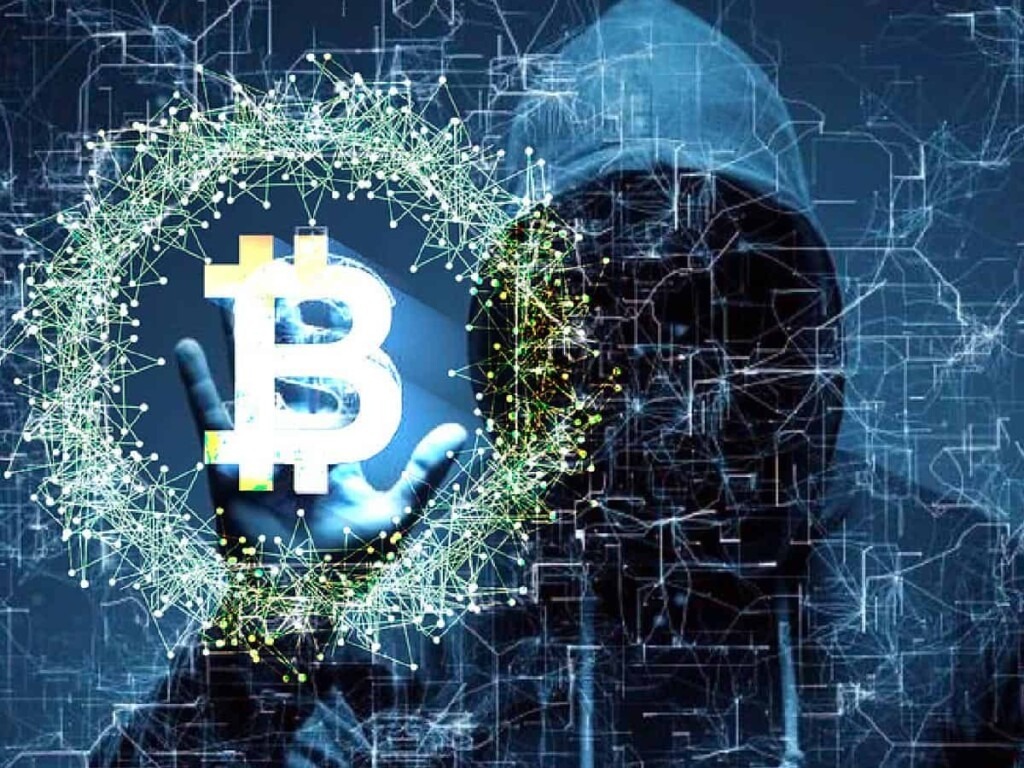

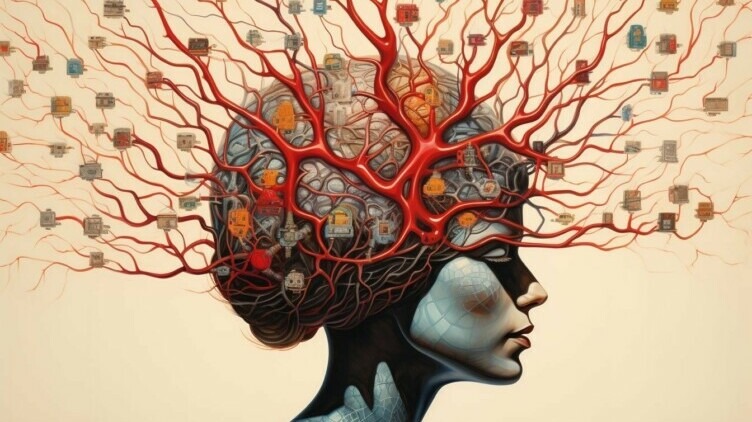

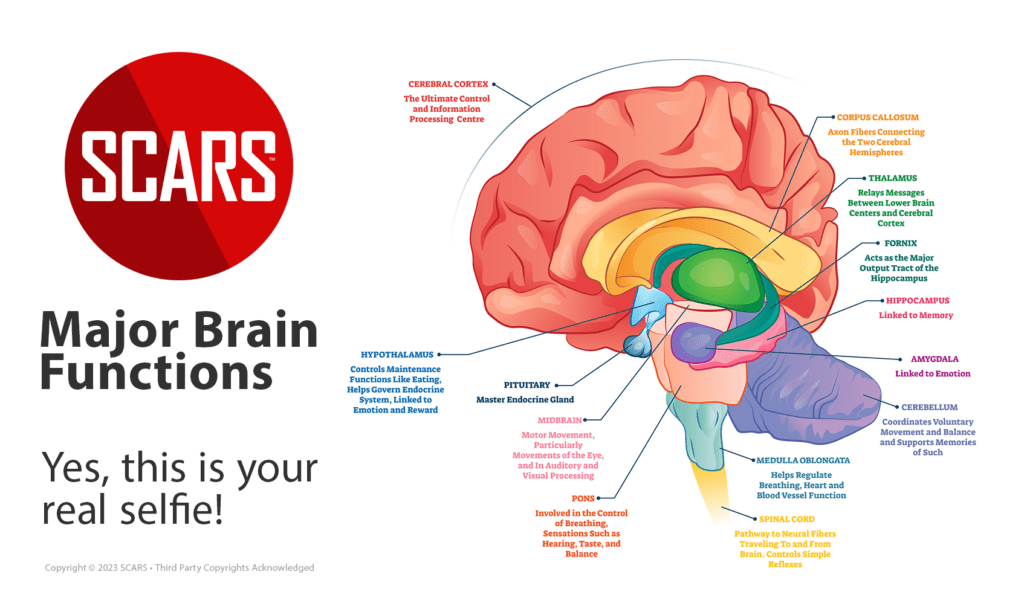
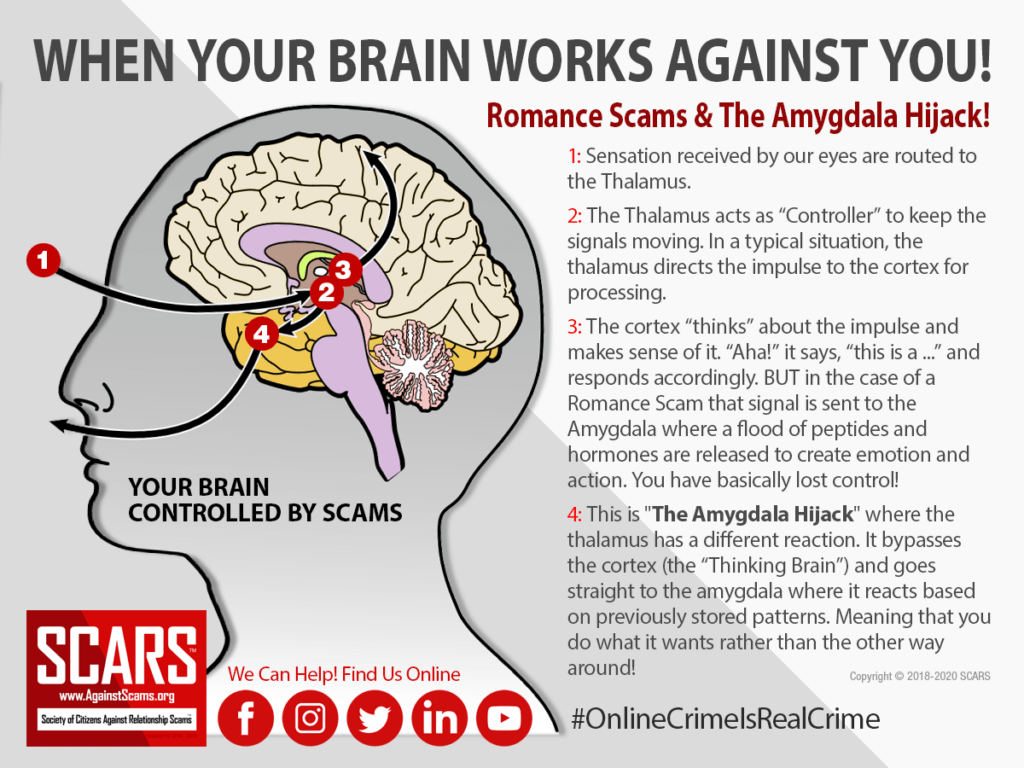
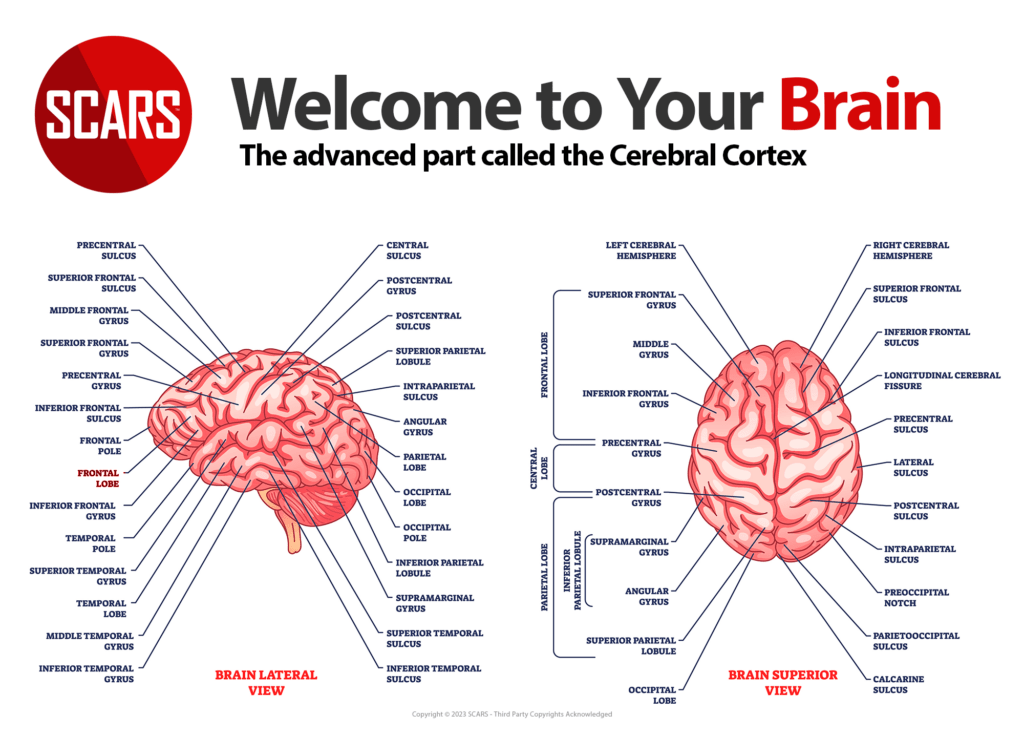
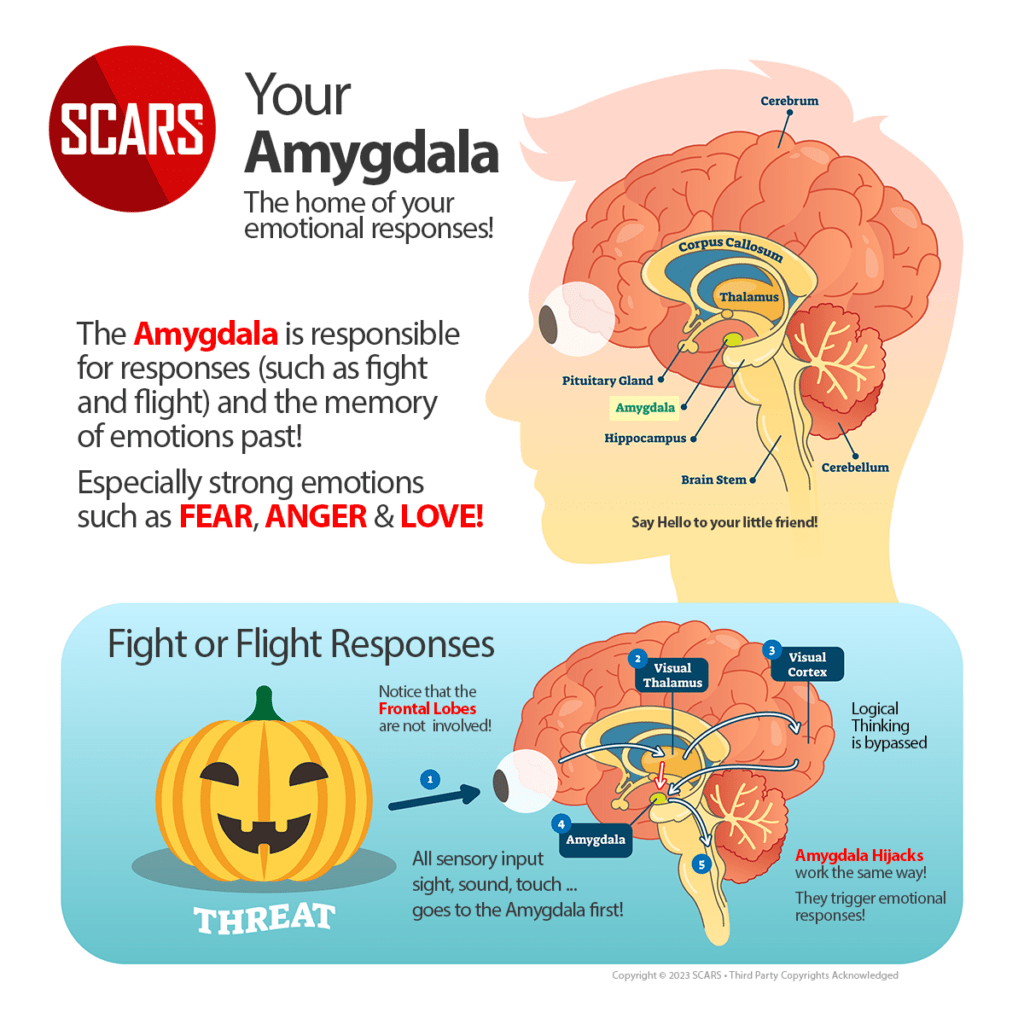
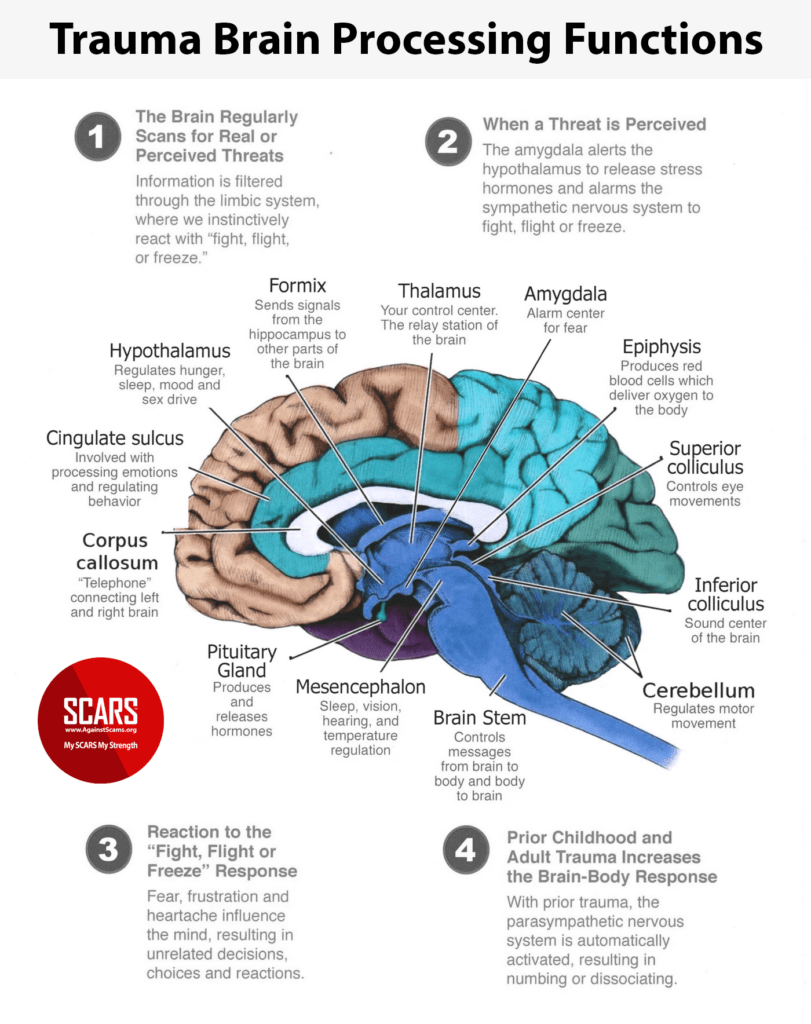
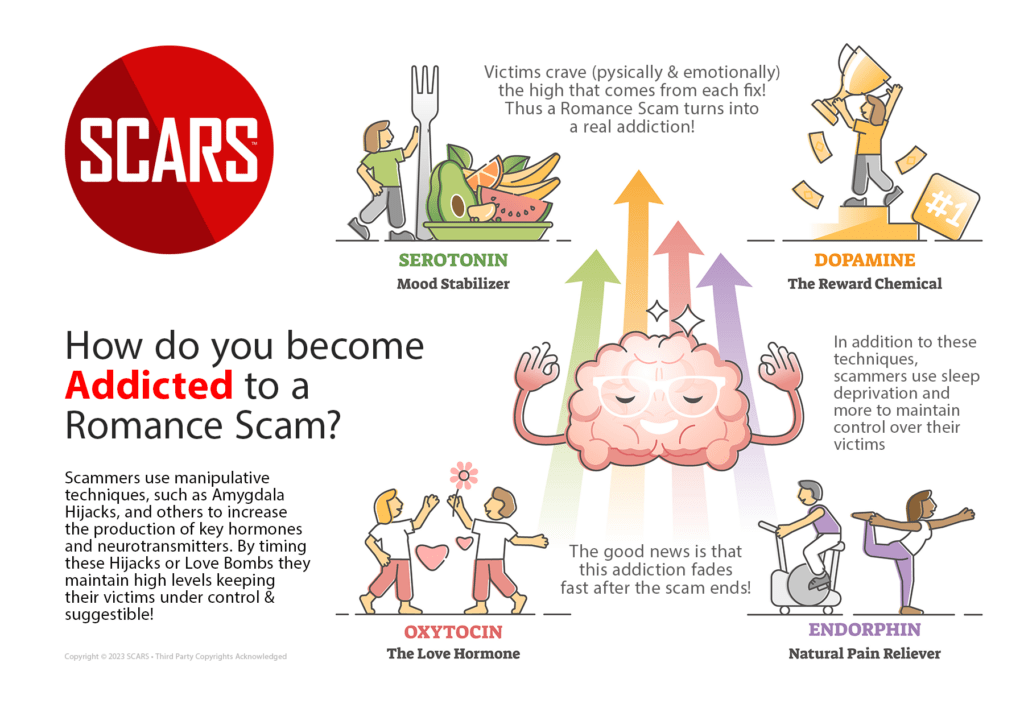









![scars-institute[1]](https://scamsnow.com/wp-content/uploads/2025/04/scars-institute1.png)
![niprc1.png1_-150×1501-1[1]](https://scamsnow.com/wp-content/uploads/2025/04/niprc1.png1_-150x1501-11.webp)

This article as with others was full of important information. Many people do not believe that trauma is a real thing, that trauma is a deeply stressful event and that the brain is in survival mode. I know a number of people that believe there is no trauma. That a person who is a good Christian would have no reason to experience trauma. Not true. A deeply stressful event could be rape, being beaten beyond enduring by someone you trusted, being robbed, or as a small child having your parent turn from you. The mind is powerful with the ability to do so many things simultaneously. It is fluid. It can breathe and walk, talk and write, enable us to feel grief, pain or shame. It has not been long since my crime ended. I can recall the love feelings I had during the crime, but the helpless fear feelings seem almost muffled or dreamlike in my mind. I know that the criminal emotionally abused me getting me to hate myself, but the actual memory of that action is hard to pinpoint and pull out of the ether of memory.
I’m looking forward to having the memory of my scam event fade and not be something I deal with on a daily basis. Unfortunately there will be a monthly reminder when making payments on the debt incurred for years to come.
Very interesting article about false memories.